Interesting stories about and for our students.
Long Zhang
Chemical Engineering
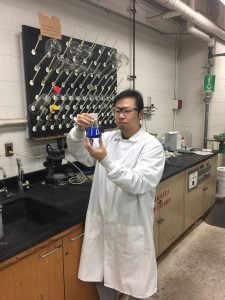 I am a Ph.D. student in Chemical Engineering Department, and this is my fourth year. My research focuses on the dephosphorization from iron ore, particularly goethitic iron ore. I have been working with Dr. Tim Eisele on this project since fall 2014. By applying both bacterial and chemical leaching methods, we are able to remove about 95% of the phosphorus from the ore making the ore successfully meet the industrial standard.
I am a Ph.D. student in Chemical Engineering Department, and this is my fourth year. My research focuses on the dephosphorization from iron ore, particularly goethitic iron ore. I have been working with Dr. Tim Eisele on this project since fall 2014. By applying both bacterial and chemical leaching methods, we are able to remove about 95% of the phosphorus from the ore making the ore successfully meet the industrial standard.
I would like to express my deepest gratitude to the Graduate School for the financial support, which allows me to focus entirely on the completion of my final dissertation. I also want to thank Dr. Eisele for his constant support throughout my entire graduate school studies.
Sanaz Habibi
Chemical Engineering
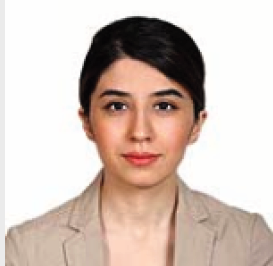 I joined Michigan Tech as a Ph.D. student in September 2014. Since January 2015, I have been working as a graduate research assistant at Medical micro-Device Engineering Research Lab. (M.D.-ERL). My research focuses on developing and optimizing reliable low-cost point of care tools for rapid and quantitative disease diagnosis.
I joined Michigan Tech as a Ph.D. student in September 2014. Since January 2015, I have been working as a graduate research assistant at Medical micro-Device Engineering Research Lab. (M.D.-ERL). My research focuses on developing and optimizing reliable low-cost point of care tools for rapid and quantitative disease diagnosis.
I want to express my gratitude to Graduate School for providing me the Finishing Fellowship. This fellowship gave me the opportunity to put my entire focus on completing my dissertation. I would also like to thank my Ph.D. advisor Prof. Minerick for her constant support and encouragement.
Jingyuan Wang
Electrical Engineering
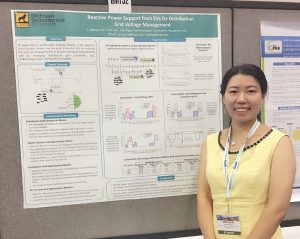 My research assistant position at Michigan Tech gives me an opportunity to not only work hard but also to work smart and efficiently towards my goals. I feel satisfaction and pride when helping and as a member of my research group. For my PhD research, I am working on demand response, optimal power flow, integration of distributed energy resources, improving computational performances on large-scale power grids with decentralized approaches, and developing Hardware-in-the-Loop simulation on large-scale transmission and distribution systems with Opal-RT, GAMS and Raspberry Pi server.
My research assistant position at Michigan Tech gives me an opportunity to not only work hard but also to work smart and efficiently towards my goals. I feel satisfaction and pride when helping and as a member of my research group. For my PhD research, I am working on demand response, optimal power flow, integration of distributed energy resources, improving computational performances on large-scale power grids with decentralized approaches, and developing Hardware-in-the-Loop simulation on large-scale transmission and distribution systems with Opal-RT, GAMS and Raspberry Pi server.
Priscilla Addison
Geological Engineering
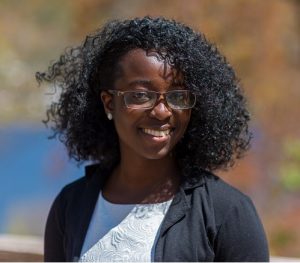 My interest in engineering started in childish defiance of wanting to prove to majority of the people I came across that girls can be engineers too, and pretty great ones at that! But thankfully it ended up being something I enjoyed immensely. My personality is more logical than emotional, so in school I found myself gravitating towards the Math and Physics subjects because of the structure in them. I enjoy that these subjects can help give the breakdown of why and how most things work. During my undergrad, I majored in civil engineering but got more interested in the geotecthnical/geological aspect of the discipline because of the encompassing nature of this subfield. I like the fact that it puts me in the heart of basically everything of the built environment since geological engineering deals with virtually everything that touches the earth! In my current role as a PhD candidate, I have been developing predictive models to isolate locations in the western US that are vulnerable to debris flows occurrences after wildfires. A recent model has been able to predict 8 out of 10 of these disastrous locations, which is a great improvement on the 4 out of 10 that an earlier model was predicting a couple years ago. This makes me so happy because it is a great step towards mitigating/ preventing the devastations usually associated with these events.
My interest in engineering started in childish defiance of wanting to prove to majority of the people I came across that girls can be engineers too, and pretty great ones at that! But thankfully it ended up being something I enjoyed immensely. My personality is more logical than emotional, so in school I found myself gravitating towards the Math and Physics subjects because of the structure in them. I enjoy that these subjects can help give the breakdown of why and how most things work. During my undergrad, I majored in civil engineering but got more interested in the geotecthnical/geological aspect of the discipline because of the encompassing nature of this subfield. I like the fact that it puts me in the heart of basically everything of the built environment since geological engineering deals with virtually everything that touches the earth! In my current role as a PhD candidate, I have been developing predictive models to isolate locations in the western US that are vulnerable to debris flows occurrences after wildfires. A recent model has been able to predict 8 out of 10 of these disastrous locations, which is a great improvement on the 4 out of 10 that an earlier model was predicting a couple years ago. This makes me so happy because it is a great step towards mitigating/ preventing the devastations usually associated with these events.
Throughout my academic career, I have been so lucky to have met so many wonderful people, especially my advisor, Dr. Oommen, who has been nothing short of supportive through all the highs and lows of this wringer of a grad school journey. He truly is amazing! I am also very thankful to the Graduate School for this award of Finishing Fellowship which is making it possible for me to fully concentrate on writing my dissertation and defending it without worrying about finances anymore. Medaase— this means “thank you” in my native language, Twi.
Xueling Li
Mathematical Sciences
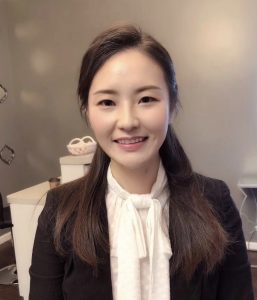 I am currently a fifth-year Ph.D. candidate in the Department of Mathematical Sciences. My research focuses on developing statistical methods and computational tools to identify genetic variants that influence the susceptibility to complex diseases. I also work with professor Dana Johnson of the School of Business and Economics to better understand service quality and patient satisfaction, and identify opportunities for improved service delivery in rural healthcare using data provided by Aspirus Keweenaw about patients in the local area.
I am currently a fifth-year Ph.D. candidate in the Department of Mathematical Sciences. My research focuses on developing statistical methods and computational tools to identify genetic variants that influence the susceptibility to complex diseases. I also work with professor Dana Johnson of the School of Business and Economics to better understand service quality and patient satisfaction, and identify opportunities for improved service delivery in rural healthcare using data provided by Aspirus Keweenaw about patients in the local area.
I feel extremely honored and very grateful for the support provided by the Portage Health Foundation, which allows me to pursue such cutting-edge research here at Michigan Tech.
Huaguang Wang
Materials Science and Engineering
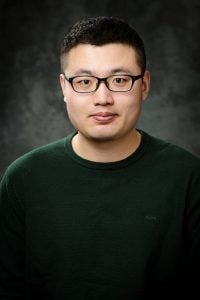 Mr. Huaguang Wang received his BS and MS degrees in Metallurgical Engineering from Central South University in China. Currently, he is pursuing her Ph.D. degree at MTU from Fall 2015 under the supervision of Dr. Bowen Li. His Ph.D. research focuses on nano-composite materials synthesis, mineral processing, and microwave technology. After the completion of his Ph.D., if an opportunity arises from his hometown university, he would be interested to take on a faculty position to perform research and teach. Secondary to that is to find R&D positions in the United States.
Mr. Huaguang Wang received his BS and MS degrees in Metallurgical Engineering from Central South University in China. Currently, he is pursuing her Ph.D. degree at MTU from Fall 2015 under the supervision of Dr. Bowen Li. His Ph.D. research focuses on nano-composite materials synthesis, mineral processing, and microwave technology. After the completion of his Ph.D., if an opportunity arises from his hometown university, he would be interested to take on a faculty position to perform research and teach. Secondary to that is to find R&D positions in the United States.David Rosen
Biomedical Engineering
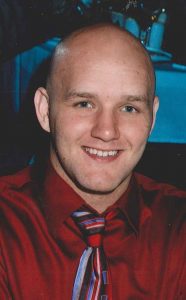 I started my graduate study in the spring of 2015, which was the semester after finishing my undergraduate study at Michigan Tech. Early on in my undergraduate study, I became fascinated with the general topic of biomechanics and the technologies associated with it. This fascination is what drew me to pursue graduate level research in Dr. Jingfeng Jiang’s lab. There I focus on a medical ultrasound technology called elastography, an imaging technique used to assess soft tissue elasticity in vivo. I am particularly interested in understanding how the complicated mechanics of soft tissue manifest in elastography measurements and what that can tell us about how best to use elastography to characterize various disease states in soft tissue.
I started my graduate study in the spring of 2015, which was the semester after finishing my undergraduate study at Michigan Tech. Early on in my undergraduate study, I became fascinated with the general topic of biomechanics and the technologies associated with it. This fascination is what drew me to pursue graduate level research in Dr. Jingfeng Jiang’s lab. There I focus on a medical ultrasound technology called elastography, an imaging technique used to assess soft tissue elasticity in vivo. I am particularly interested in understanding how the complicated mechanics of soft tissue manifest in elastography measurements and what that can tell us about how best to use elastography to characterize various disease states in soft tissue.
The opportunity to pursue this line of research for my graduate study has been a privilege. I am immensely grateful for the support that the Portage Health Foundation has provided me in this pursuit.
Anindya Majumdar
Biomedical Engineering
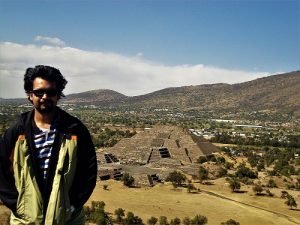 I am a PhD candidate in Biomedical Engg. at MTU. Water and biological tissues act as excellent sources of optical scatterers, and thus give rise to fascinating optical phenomena. My research focuses on ways to make use of these phenomena (specifically, speckles and phase singularities) for novel ways of imaging and analyzing motion in biophysical systems. Outside of work, my time is spent exploring the beauty of the U.P. and the surrounding areas, as well as trying out the excellent variety of student organizations at Michigan Tech.
I am a PhD candidate in Biomedical Engg. at MTU. Water and biological tissues act as excellent sources of optical scatterers, and thus give rise to fascinating optical phenomena. My research focuses on ways to make use of these phenomena (specifically, speckles and phase singularities) for novel ways of imaging and analyzing motion in biophysical systems. Outside of work, my time is spent exploring the beauty of the U.P. and the surrounding areas, as well as trying out the excellent variety of student organizations at Michigan Tech.
Kevin Phillips
Integrative Physiology
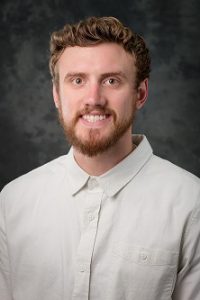
I have been living in the Upper Peninsula for 5 years and began my Ph.D. at Michigan Tech in 2015. I am currently a Ph.D. candidate in the Integrative Physiology program. I have always loved the outdoors and exercise. Therefore, my research is focused on understanding how environmental demands and thermal interventions (hot/cold water immersion) influence performance and the perception of fatigue during physical exercise. We use a variety of techniques to quantify muscle and brain activation during these fatiguing tasks. This research may provide us with important implications for improving athletic performance and managing the perception of pain in clinical populations. I would like to thank the Portage Health Foundation, Michigan Tech, and my mentors. Their support has provided me with an incredible opportunity to accomplish my goals.
